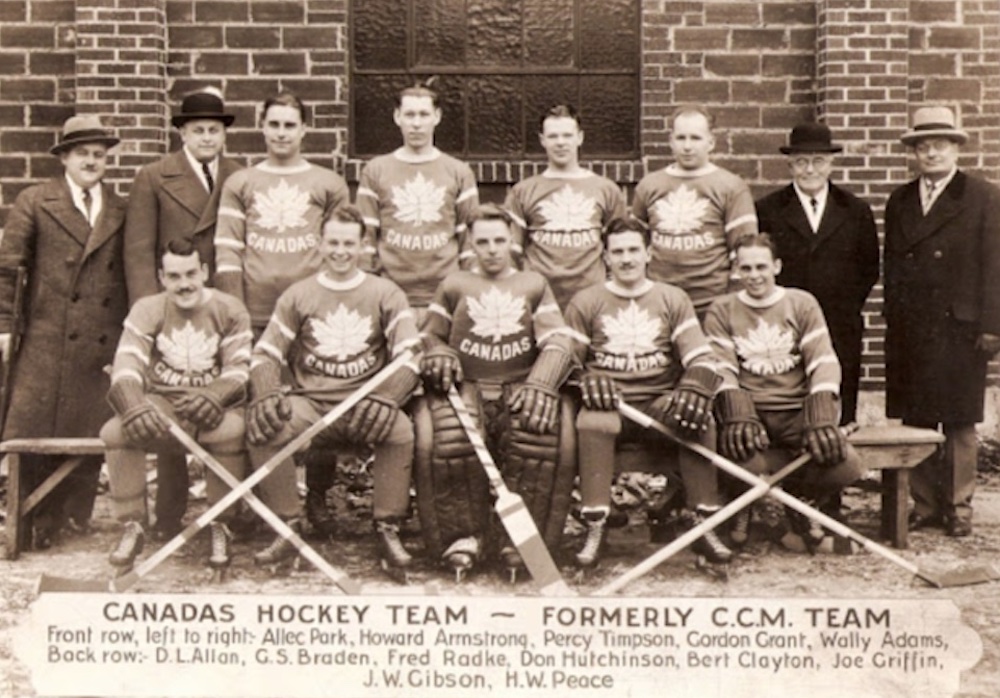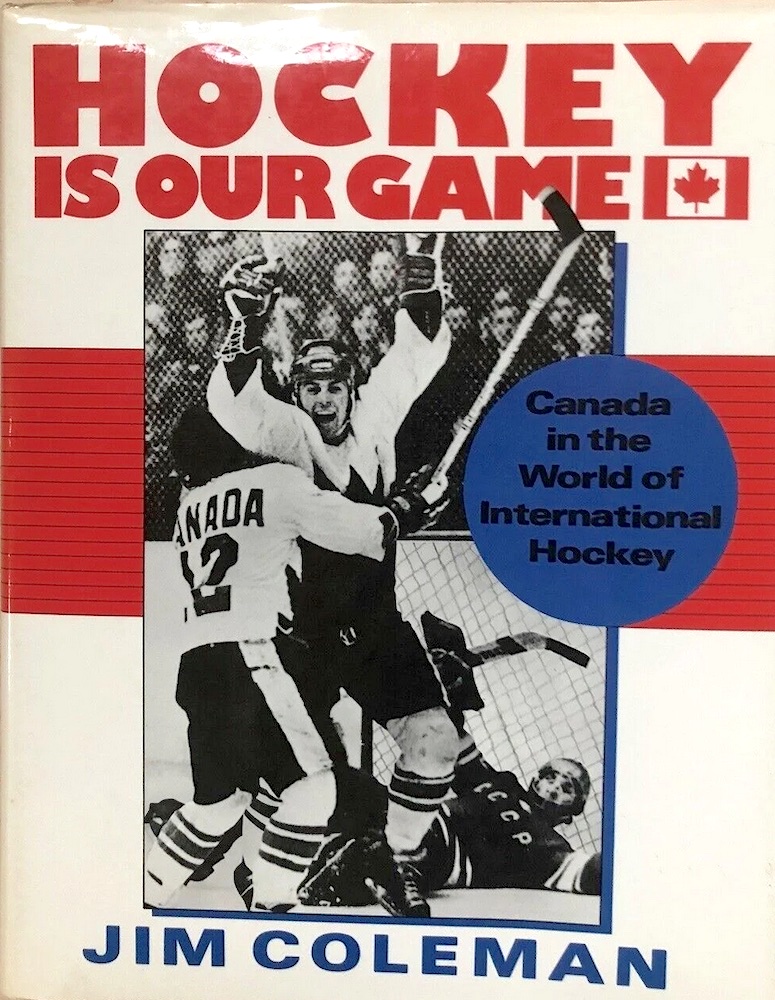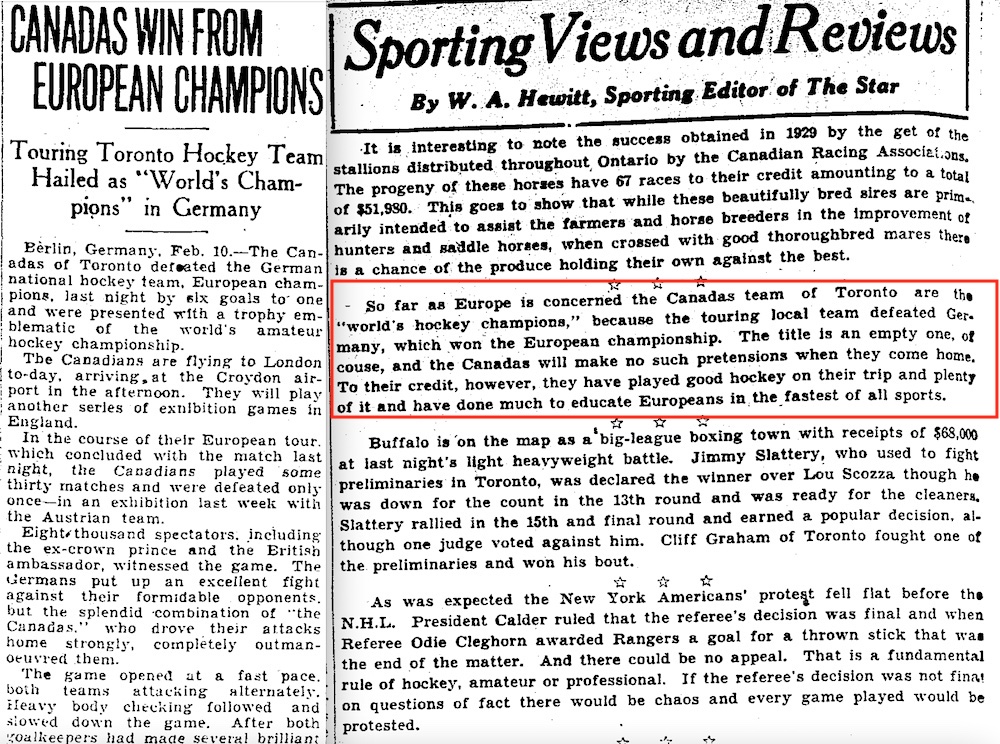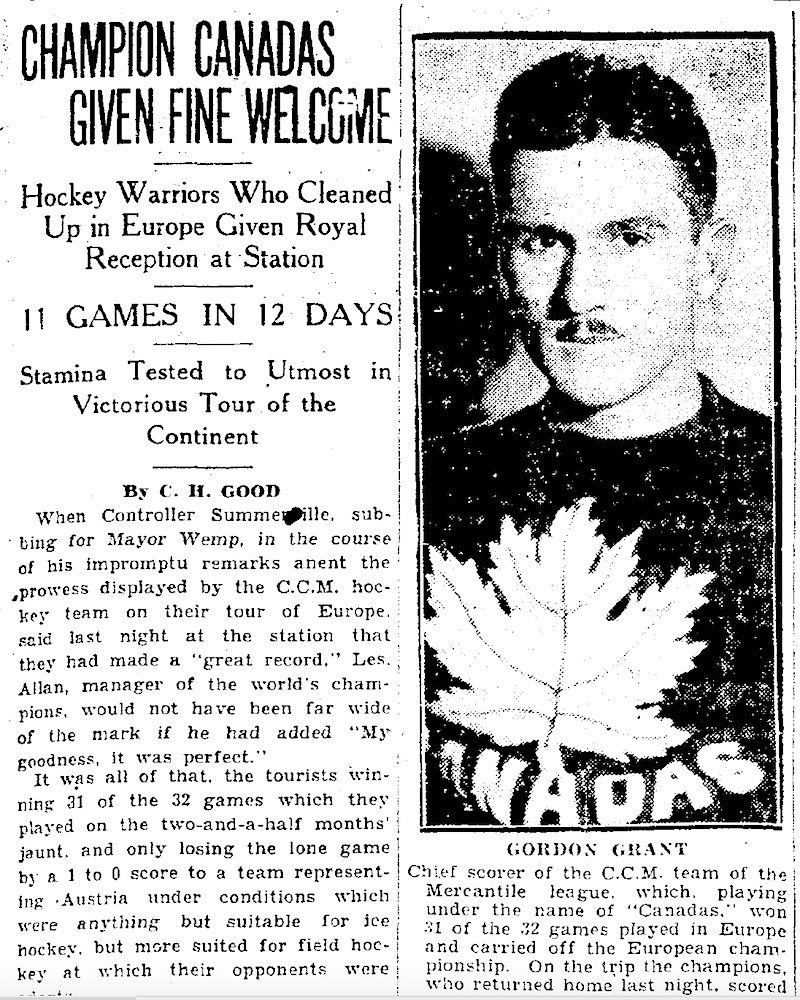Canada won the World Championship in hockey on the weekend. Yay, us! But the tournament has never really attracted a lot of attention in this country. When Canada was dominating in the early days, everyone here knew the amateurs representing the country in Europe weren’t the best players we had to offer, since the pros in the NHL weren’t allowed. And, of course, that became our national excuse when the Soviet Union began to dominate during the 1960s.
The vast majority of Canadian hockey fans have always been much more interested in NHL teams and Stanley Cup victories than the World Championships. It’s also part of the reason why, when it comes to international hockey, we long for the “Best-on-Best” format of the Canada Cup/World Cup and so enjoyed the Winter Olympic tournaments of 1998 through 2018, when the NHL was allowing its best players to compete … which hasn’t been the case at the last two Winter Olympics.
Still, the victory on Sunday — 5–2 over Germany — gave Canada 28 world titles all-time; one more than the Soviets/Russians. So, again, yay us! That said, I barely paid any attention this year myself … but it was an interesting tournament. Latvia won the bronze medal by defeating the United States 4-3 in overtime for the first World Championship medal in that country’s history. Germany’s silver was their first medal since 1953. And, it was the first time the Germans faced Canada for gold since 1930 … which was the very first year the hockey World Championships were conducted separately from the Olympic Games.
And therein lies the rest of my story.

I guess it was in early May, back in 1994, when I first began to do some research into the 1930 World Championships. I had, by then, published my first book, the novel, Hockey Night in the Dominion of Canada, and had since managed to sell a few articles about sports history (mainly hockey) to various Toronto newspapers. With Canada en route to its first hockey World Championship in 33 years, I figured there would be (or maybe there already had been — I can’t remember!) plenty of stories coming out about the 1961 Trail Smoke Eaters. So, I thought, instead of re-hashing the last Canadian World Champion team, I would write something about the first one.
I remember reading a little bit about the 1930 tournament in the book Hockey is Our Game, by the esteemed Canadian sportswriter Jim Coleman. Coleman wrote that Canada was represented at the tournament by the 1929 Allan Cup champion Port Arthur Bearcats. That made sense to me, since I knew it was often the previous year’s Allan Cup champions — the senior amateur champions of Canada — who represented the country at the World Championships and Olympics in the early days of international hockey.
So, I went down to the Metro Toronto Reference Library to read through microfilm and see what I could find. Again, I can’t recall precisely, but my memory is I spent the whole day searching through either a Fort William or Port Arthur newspaper. (It’s possible I was searching through The Toronto Star or The Globe and Mail … but I don’t think so.) Anyway, I began in the fall of 1929, and just kept searching. The Port Arthur team started out playing their local season schedule … and kept on playing. As they did, I kept expecting to find a story one day saying they’d been invited to represent Canada overseas, and so had dropped out of the local hockey scene to head to Europe.
But then it was March and the playoffs were starting. And Port Arthur kept playing.
The Ports (as they seem to be called — not the Bearcats) won the Thunder Bay championship, and then defeated the Manitoba champion Elmwood Millionaires in a Western Canada semifinal. Meanwhile, the British Columbia champion Trail Smoke Eaters defeated the Alberta champion Blairmore Bearcats and then beat the Saskatchewan champion Saskatoon Quakers in the other Western semifinal (I looked all that up now) before Port Arthur eliminated Trail in the Western Final and advanced to play the Montreal AAA for the Allan Cup.

Even then, I still expected to find a story saying Port Arthur was going to bail on the Allan Cup and head over to Europe. I didn’t know yet that the 1930 World Championships had actually taken place between late January and early February. But then, I came across a photo in the newspaper of the Canadas Hockey Team of Toronto who had represented the country at the tournament!
Who were they?!?
I don’t remember when I began the research that would eventually lead me to write about the Toronto Canadas (who were actually the Toronto CCMs — more shortly). Nor do I remember how I tracked down a phone number for Jim Coleman. But I did. I don’t remember if he was still living in Toronto, or if he had already retired to Vancouver. Wherever he was, and however I got the number, I called him.
I told him he’d been mistaken in his book.
He couldn’t have cared less! Couldn’t have been ruder to me, actually.
(I shouldn’t hold a grudge, but nearly 30 years later, it’s still lessened my opinion of him!)
Anyway, I would come to learn the CCM sporting goods company had been entering a team in the Toronto Mercantile League since at least 1923. My brother Jonathan and I produced a short TV feature about the Toronto CCM team and the 1930 World Championship for TSN in 1997. Unfortunately, the Toronto Blue Jays fired manager Cito Gaston around the time our piece was supposed to air and we got bumped … but TSN did show it later, and it was pretty exciting for us.

I would later write about the team again for The Toronto Star on April 26, 2005. Much of what I’m about to say here comes from that story. As I wrote then, CCM won not only the Toronto Mercantile title in 1929, but also defeated the winners of the city’s Mining and Brokers League too, and that fall, CCM executive George S. Braden travelled to Europe on business. While there, he decided the growing number of hockey teams in Europe would benefit from increased exposure to Canadian teams. (He no doubt saw a lucrative new market for CCM merchandise too!)
Braden obtained permission from the Canadian Amateur Hockey Association to send the CCM team on a European tour. Since the International Ice Hockey Federation had decided to expand its annual European Championship into a World Championship in 1930, the Toronto team — wearing a white maple leaf on red sweaters and with the name “Canadas” emblazoned beneath — would represent the country at the new tournament.
Nine of the 11 men who had played for CCM’s championship team gathered at Union Station on December 5, 1929. One day later, goaltender Percy Timpson, defencemen Joe Griffin and Fred Radke, and forwards Gordie Grant, Wally Adams, Don Hutchison, Bert Clayton, Alec Park and Harold Armstrong, along with George Braden and coach Les Allan, set sail from Saint John, New Brunswick. They arrived in London on December 14 and defeated the British All-Stars 6-2 at the Wembley Ice Club three nights later.
Averaging a game every second night, the Canadas scored victory after victory en route to the World Championship, which was scheduled to begin January 27, 1930. Unfortunately, warm weather at the outdoor venue in Chamonix, France, pushed back the start until January 31. The round-robin system was abandoned in favor of a knockout format that would serve as the European Championship. With no U.S. team present, the Canadians were given a bye directly into the finals, where they would face the European champs for the World title.

To stay in shape while the European teams knocked each other out, the Canadas scheduled games in Vienna, and on February 7, 1930, during a stretch of three games in three nights, they dropped a 1-0 decision to the Austrian national team on an outdoor rink that had been waterlogged by a day of rain. They bounced back the next night with a 6-0 win over the Vienna Skating Club, then boarded a train for Berlin, where they would face Germany in the World Championship final (which had been relocated to an indoor arena) on February 10.
Buoyed by a hometown crowd and taking advantage of their weary opponents, Germany’s Gustav Jaenecke beat Percy Timpson for the game’s first goal, but Gordie Grant retaliated quickly. A few minutes later, Alec Park put the Canadas on top. Grant and Park scored again in the second period, while Red Armstrong and Joe Griffin tallied in the third for a 6-1 Canadian victory.
Back home in Canada, the World Championship victory was newsworthy, but hardly noteworthy. “The title is an empty one, of course,” wrote Toronto Star sports editor W.A. Hewitt in the paper on February 11, “and the Canadas will make no such pretensions when they come home. To their credit, however, they have played good hockey on their trip and plenty of it, and have done much to educate Europeans in the fastest of all sports.”
Having won the World Championship, the Canadas flew from Berlin to London and finished their tour. They arrived back in Toronto on the evening of February 25. In their 83 days abroad, the Canadas had travelled 22,500 kilometers, played 32 games, won 31, and outscored their opponents 304-26.
The City of Toronto held a small civic reception for the Canadas/CCM team at Union Station on the night of their return. In reporting on it in The Star on February 26, writer C.H. Good was quite complimentary of the team, and although his story mentions they would be “sure of a great reception when they show themselves at the Ravina rink where the Mercantile League first playoff game is scheduled, and also tomorrow noon when they will be guests of honor at a luncheon to be tendered by the West Toronto Kiwanis,” and, furthermore, that a civic dinner, or, at least “something of the sort” had been promised by the city fathers on hand at Union Station, I could find nothing to confirm any of it.
And so, Canada’s first World Champions of hockey soon faded into obscurity.
I wasn’t the first to uncover their tale, but I’ve certainly done my part.
And I still think it’s a pretty neat story!
Excellent article (as usual) Eric. Given the talent that is missing from the tournament every year, “World Championship” has been a misnomer IMO since the 1970’s. However, “NHL consolation and guys playing in European leagues Championship” doesn’t have the same ring to it.
Eric:
I’m with you; we don’t pay enough good attention to our great Canadian teams, Olympics, world championships, etc. I’m afraid that the sports media are somewhat responsible for our lack of enthusiasm.
As always, it’s gratifying to get another history lesson about another Toronto team; although the Leafs of that era were more my cup of tea. It’s a fascinating tale. Also, for me, very sad. Starting in 1946-47, I began subscribing to the Globe and Mail. It was delivered to my Brooklyn home the next day; miraculous, I thought. And every day I’d clip stories about my favorite team. They were written by the likes of Jim Vipond, Tommy Munn(s) and Al Nickelson. I pasted them all in my scrapbooks which I have saved until this day. But my far and away favorite — for both style and humor — was Jim Coleman. Sad that he was rude to you and in error. But I still love him the same.
Coleman definitely had style! Though I’ve never been a fan of the idea of just making up stories … like the Curse of Muldoon. But he was definitely from a different era…
As I emerge from the Tardis on Yonge Street in 1929, a passerby I befriend asks: “So what are up to this week?” My response: “Well, I’m going to the Maple Leafs game tonight followed by a Toronto Mercantile League game tomorrow and then I’ll check out a Mining and Brokers League game the next night.” Sounds like my kind of town!
No shortage of hockey in old-time Toronto!
I see a Manitoba team was the Elmwood Millionaires. Today all pro athletes really ARE millionaires.
We care little about the “world” champions today, but rather that a Canadian team, yet again, won’t have their names engraved on Lord Stanley’s mug. Nor will a child urinate in it to the horror of Canadians. And if one does well “uncouth Yanks!”
In my adult years (Adult? Me?) players of teams that didn’t make the NHL playoffs represented their home countries at the “world”. Sort of second-class sports. And, like figure skating, the word “world” is zenophobic in its use. Just like our neighbours to the south think a baseball team, such as Houston, won a cup playing against all others in the planet, when the trophy was just something a newspaper, called The World, donated.
But when real amateurs win something we don’t applaud as we should.
When the U.S. Pres. joked that George Herman Ruth made more in salary, the Babe rejoined “how many home runs did HE hit”? Measuring all things in terms of money.
Speaking of baseball,when will our local team show guts and morality by dumping the homophobe Bass? His reply reminds me of the old trope Antisemites have used since before I was born…” Bigoted? Me? Some of my best friends are Jews!” OK James Keegstra…name one!
Great article as usual. Reminds us of a time when sports were for exercise, fun and recreation. What Mitch Marner will make a year with a new contract could pay for a nice retirement home with all the trimmings for all of use….for life!
Simple answer: These championships are small potatoes to sponsors. If big money isn’t involved these world championships won’t make history. The only exception may have been the game with Russia and Canada, and WE won! Professional atheletes make far more than necessary, tickets are over priced, the sales of sweaters, hats, etc., make lots of money, and everyone wins with making money, thanks to sponsors who only think of the bottom line, $$$$$$
Moral and ethical standards, fair play, etc., are forgotten in the over charging for everything at an event, forbidding anyone attending bringing their own snacks, beverages, so they are forced to pay for choices that would cost what family would use to buy a few days of items for the family dining room. Sorry, until people stop buying these items and can go to a game for a reasonably priced ticket and a ceilings are put on players salaries, things will get worse. And World Championship Games will slowly disappear as there is no money made by anyone.
I don’t watch pro sports very often, if at all, and I certainly won’t stand to watch a game on jumbotron sets in our city. But if someone comes up with a cure for Parkinson’s, Cancer, etc., I will cheer and not begrudge any amount of money to the lab people!!!
Greetings to Eric and all you Canadians commenting the excellent presentation of the Canadas/CCM World champion of 1930!
Yes, the World Championship has been more ‘Our Thing’ on this side of the Atlantic. But it seems to be needing something more these days. In the Cold War era the Russians, Czechs and Slovaks couldn’t enter abroad, not even to Finland or Sweden. When the Iron Curtain broke down in the 1990s, the Stanley Cup seems to have gained a bit bigger appreciation in Europe too.
I’ve been studying the European Championship, World Championship and Olympic history between 1910-2010. I started in 1996 and have ‘retired’ in 2022. Being specially interested in the Canadian club teams representing Canada between 1920-1964. I have been running a website about the subject between 2006-2022 about the matter with some success and the link can be found with this post if someone is interested.
Based on my studies one reason for these tournaments not being so big in North America seems somewhat to be the inferiority complex of European hockey circles at the time around this first World championship.
Though the media has its share, like Les Stoch has said. Judith Ross mentioned big money. Yes, the biggest money with these tournaments come from our European side.
I think only I can see the link in what you posted.
So, here it is in case anyone is interested:
https://centennialhockey.wixsite.com/site?fbclid=IwAR3sdPgeieimIcEIcJEBCl-UfpkG3zf1Bq_m4BC4W-fVV5rRCveqNq7E_ao